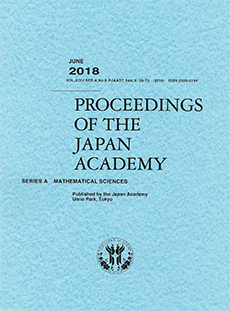Abstract
Let $q$ be an odd prime. Let $c>1$ and $t$ be positive integers such that $q^{t}+1=2c^{2}$. Using elementary method and a result due to Ljunggren concerning the Diophantine equation $\frac{x^{n}-1}{x-1}= y^{2}$, we show that the Diophantine equation $x^{2}+q^{m}=c^{2n}$ has the only positive integer solution $(x, m, n)=(c^{2}-1, t, 2)$. As applications of this result some new results on the Diophantine equation $x^{2}+q^{m} = c^{n}$ and the Diophantine equation $x^{2}+(2c-1)^{m} = c^{n}$ are obtained. In particular, we prove that Terai’s conjecture is true for $c=12,24$. Combining this result with Terai’s results we conclude that Terai’s conjecture is true for $2 \leq c \leq 30$.
Citation
Mou-Jie Deng. "A note on the Diophantine equation $x^{2} + q^{m} = c^{2n}$." Proc. Japan Acad. Ser. A Math. Sci. 91 (2) 15 - 18, February 2015. https://doi.org/10.3792/pjaa.91.15
Information





